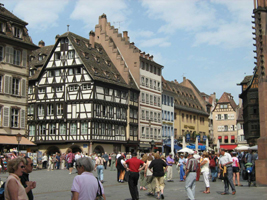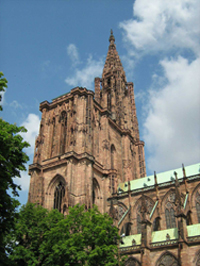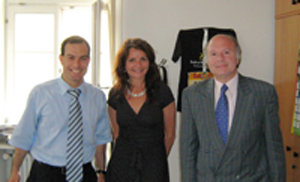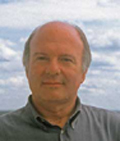Living in France, working in Switzerland and shopping in Germany: when Europe
is a routine

At Strasbourg the hotel is a long way off: two trams and then the bus. I exchange a few words with the people waiting alongside me.
“What do you think of the Euroregion
Haut-Rhin?”
“Qu’est ça? Euro, euri… quoi?”
I show a distinguished-looking woman with a laptop bag in her hand the map printed off the website. “Nothing new – it’s us and the surrounding countries. Is it a project?”
“It’s been in existence since 1975 you know, it’s when one lives in one country and works another, the airport of Basel-Mulhouse, and the 1975 Bonn Accords.”
“Yes, yes, now I understand, here we’ve always cooperated with each other, there’s no need for anything new, we’re the same people speaking the same dialect, similar systems.”
“The same dialects, dann darf ich auf Deutsch weiter reden?”
“Non, non, monsieur, c’est le Français que nous apprendons à l’école, aussitôt l’Anglais, un petit peu.”
Here I am in a stronghold of the European Union, and the lady doesn’t seem very enthusiastic, just six kilometres from the German border, and she doesn’t speak the neighbours’ language. Here I am full of enthusiasm for ‘her’ Euroregion, and she doesn’t even know what it is.
Now I’m waiting next to a policeman.
“I’m here to do a story on the oldest of the Euroregions …”
“And what’s that? Let me guess… the Basque Countries!”
“Je régrette, we’re actually in it, Haut-Rhin.”
“In practice we always have been, we’re a peaceful people, one of the richest areas in Europe with similar cultural roots. Do you know, my brother works in Basle for a chemical company, Novartis, do you know it? He earns the same as the Swiss, lives in France, pays taxes like a Frenchman and on Saturday does the supermarket run in Germany. This is the European reality, not the Euroregions!”
I’ll sleep on it.
On the opposite bank: Kehl
After three stops on the tram I get on a bus that leaves every 15 minutes for Kehl, across the Rhine in Germany. At the border there’s an enormous French Pharmacie where many medicines cost less and the pharmacists are less strict in their prescription requirements. A few yards away is the Ponte d’Europa, the railway station and the centre of Kehl. Five tobacconists’ shops with their signs in French just across the border show me one of the attractions of the open borders. So far the Euroregion consists of pharmacies and cigarettes. Before my appointment in the headquarters of the Euro-offices I find I have some time to get a feel for the place.
Touristenpavillon: I go in and find tourist brochures covering both banks, the Museumspass, that for a modest fee allows the visitor into 140 museums in France, Switzerland and Germany, a quarterly magazine (€3.90) with the calendar of the main events in the three areas, the posters for the Rheinfest, a joint festival between Baden and Alsace in the Park of Two Countries, separated by the Rhine and linked by a footbridge.
“What do you think of the Euroregion?” “Euregio, haben wir so was?” “Yes, yes! You’ve had it since 1975.” “Komisch, I never knew! Do you know, here we’re used to having French colleagues, a French pension and a German one, a relative that works in Switzerland, shops that prosper with the transborder trade, festivals sponsored by the local councils since way back, town-twinning – what do we need a Euroregion for? The Euro, Schengen, these are the things we need!”
The town centre fills with French housewives of various races, studying what’s on offer and coming out the shops carrying large parcels.

The next stop is the AOK, Germany’s biggest health insurance company. An employee invites me to sit down and we start. “What effect has the Euroregion had on your work?” “Was meinen Sie bitte, Euro… was? Wie war das noch mal?” She calls her boss: “Yes, you could say that it helps us in our dealings with the French: it’s only a new name. For decades we’ve been dealing with requests for services in Strasbourg or in Switzerland. Certainly, once upon a time compensation was a problem when dealing with the Swiss, but not any more. A German ambulance could not enter France with its sirens blaring, now we can. Every transboundary worker has the right to seek treatment, even by a family doctor, wherever he or she sees fit and for a few years now Switzerland has evened up the assistance for acute cases. We work with an automatic search for available hospital beds in all three regions. Is this what you mean by a Euroregion?”
The Press Office in the local council headquarters. The lady I speak to is polite but balks at the term ‘Euroregio’ saying that the press and politicians talk about it but one should really say ‘Eurodistricts’ adding that these consist of adjoining regions, similar in function to the Italian provinces or British and Irish counties that each have an employment office or Jobcentre, a local parliament and are made up of a number of constituent municipalities. The main role of these Eurodistricts, which are also well known in France, is to match up the supply of, and demand for, workers on either bank of the Rhine and smooth the paperwork involved in unemployment, health and other social services.
Still with an hour to kill before my appointment in the headquarters of the ever-less obvious Euroregion. I spot an Estate Agent. “After an explosion in the prices around Strasbourg our French clientele with the means came here to look for a house. The prices in the areas along the border have increased but are now undergoing a consolidation. Most people were looking for detached family homes for their own use. We haven’t been approached by any big investors”.
The prices are in line with those in other German cities on the Rhine: a small detached house costs about €300.000, semi-detached ones will set you back a quarter of million while an apartment of 100m2 can be yours for €180.000. The day after, I compared the prices with those in Alsace and the differences I found were minimal.
It’s 1 pm and I sit at a table outside a cafè and smell the unmistakable odour of sewage. A cry from one of the workmen makes me jump: “Merde, les Fritz ont construí des égouts incroyables! Et ils disent que nous les Français ne savons pas travailler bien! ”. Two French repairmen hard at work amid the unappetising pong, the sighs of Germans on their lunch break and French housewives hunting for bargains.
At the Upper Rhine Conference
The H.Q of the Euroregion is in a small nineteenth century building in the middle of town. Occupying three rooms on the ground floor is INFOBEST, an office with the task of advising the citizens in their dealings with the Authorities, taxes, social issues and transboundary projects.
On the first floor, again in three rooms, is the secretariat of the German-French-Swiss Conference for the Upper Rhine, consisting of the only four paid employees of the Euroregion: a commissioner for each of the three countries and a secretary. I’m met by the German commissioner, Michael Frey.
“Before long the Euroregion will no longer have this name, which, in any case, was never official. It’ll be called a ‘Metropolitan Region’. We began cooperating at a local level in 1950 and in 1991 the ‘Eurodistricts’ were officially recognised and were made up of two coordinating bodies: the Commission (the regional, cantonal, provincial councillors and mayors) and the Conference, made up of four public appointees. The President is the Prefect of Karlsruhe (an administrator nominated by the President of the Land). The Secretariat is the executive body.”
“You don’t have a directly-elected Parliament: are you a judicial entity, as we call it, this Euroregion?”
“We have neither a directly-elected Parliament nor are we a judicial entity and neither do we have powers to pass legislation. We’re a body that deals with the problems that neighbours have, including the economy, science and civil society. We work on strategies to resolve these problems and if this includes legislative matters we propose them for the approval by the competent body: in Germany it’s the Länder, in France, the Parliament, and in Switzerland the various Cantons. Sometimes local proposals lead to changes in national laws, We’re a bottom up Euroregion: we act first, resolving problems by drawing up local agreements and then we look to the States for approval. First the concrete projects and then the structures. I don’t believe we’ll gain any further powers such as the ability to legislate as no one feels the need for it and we don’t have any influence over national legislation in States other than our own.”
“How do you finance your initiatives?”
“In the first instance using the INTERREG funds of the EU. We also help the local councils, businesses and associations when they are putting together the necessary documentation. Moreover we act as mediators between the Authorities in the different States.
“Which are the main projects you are involved in?”
Sylvia Müller-Wolf, coordinator of the Karlsruhe Employment Bureau joins us and all three of us discuss the question.

“In 1986, when the stockpiles of the chemical company Sandoz in Basle caught fire, we realised that we needed to coordinate civil protection in the area. We organised an information and mutual aid network doing exercises together during which we saw the need to unify the procedures and understand each others’ languages – problems that we are resolving with a bilingual manual dealing with the issue. In 2007 a joint-owned fire-fighting ship was put in position, at anchor between Strasbourg and Kehl and equidistant from the two boats already available.”
“The ‘Health’ working group, founded in 1996, aims to rationalise structures to improve the services available and lower costs.
Our main role is the coordination of the emergency health services, ensuring that we have information on all the available hospital beds in the three areas, arranged by specialisation and centres of excellence, which all the citizens have access to, regardless of where they come from. For programmed (rather than emergency) treatment we’re creating a telematic database that will show us the hospital beds and operating theatres available at that moment. In addition we are working to harmonise the health systems and anti-drug abuse policies.”
“In the case of programmed hospital treatment is it automatically referred to structures in one of the neighbouring States?”
“Not yet. For programmed hospital treatment you need to ask for the O.K from your local Health Trust , authorisation which you receive almost immediately”.
“Environmental protection includes a joint system to detect air pollution (financed with EU INTERREG III funds), and there’s an agreement on the maximum permitted levels of pollutants in drinking water, whilst an incinerator on French territory was closed down to safeguard a Natural Park. A commission is studying the key factors governing climate.”
There then follows a vociferous exchange on the fact that there are few opportunities to influence the nuclear programmes of the neighbours and reflections on the meagre budgets available for culture. The total annual funds for the exchange of theatrical works and shows is a mere € 33,000 which is split between the three States and distributed by a joint commission.
“But how do the citizens understand each other?”
“That’s a sore point. In all three countries the main obligatory foreign language is English. In Alsace there is still a good 40% of the population who speak a dialect of German, mostly the elderly: the youngsters speak their national tongue and, at least in France, at school, they choose what for them is the easiest option as a second language: Spanish. In another ten years the German-speaking minority in Alsace will be further reduced. There are bilateral projects to promote the learning of languages: a bilingual school manual, town-twinning (supported by the local councils), events, student exchanges and financial support for youngsters who do a work placement in another country as well as cross-border meetings (financed to the tune of €20,000 a year by the EU). But today’s youth is too lazy to study another foreign language and there is still a long way to go.”
“We’ve got good results in the cooperation between businesses in key sectors in the area: research, high technology and tourism. With joint marketing we publicise the advantages of our area and in this way we promote the arrival of new businesses.”
“Cooperation on infrastructure is the oldest strand, beginning in 1949 with the Basle-Mulhouse airport. The entire region is served by the TGV (Train à Grande Vitesse) that connects the main European cities (I saw an excellent line running north-south but the east-west one is rudimental and tied to that of the individual State concerned). Workers’ mobility is dependent on the local railway lines such as those that link Karlsruhe to Wissembourg and from southern Alsace, through Basle to Baden. We are also working on joint season-tickets. One problem is that the railway bridge on the Rhine (linking Paris and Stuttgart) has only one line. Doubling-up this line would cost money and so we’ve looked for solutions: in the Peace Treaty there is a list of works that Germany must do by way of war reparations. The second railway bridge on the Rhine at Strasbourg is one of the few works that remain to be done…”
I leave with the impression of having understood the reason why the ‘Euregio’ remains so little known amongst the citizenry: it is an obvious thing and takes place in the background, especially at a local level, without a real staff, it doesn’t legislate or publicise itself. We are dealing with regions that are economically and culturally rather homogenous, that have been working together ‘privately’ for centuries, to which the ‘Metropolitan Region’, has brought, above all, an all-pervading coordination and has opened up important labour markets.
I find myself at dinner in the garden of a Strasbourg restaurant together with some regular customers and take a place at their table.
Almost every one of them can tell me about a relative who has found work in Germany or Switzerland, of health insurance problems sorted out by INFOBEST in Kehl, but none of them links these small but decisive events with a supranational body, saying simply: “Monsieur, l’Europe c’est ça!” x
Author of this story: Julius Franzot

Writer, translator and publicist with a degree in Pharmacy, he was a manager in the pharmaceuticals industry in Germany and Italy. Julius Franzot is bilingual (German and Italian) and was born in Triest, from where he works in support of Mitteleuropa through culture and politics.